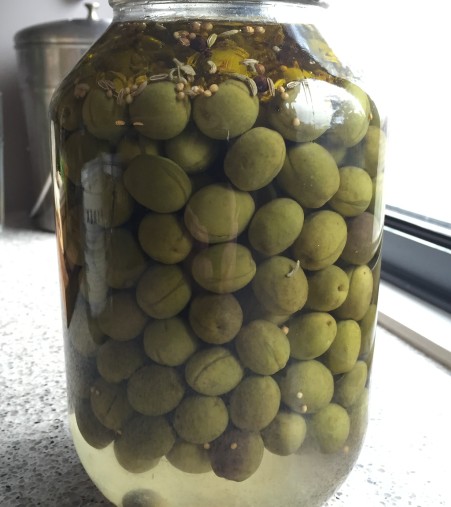This recipe has been a while in the making…way back in early March, when we had a big family party that I mentioned here, my parents brought me a box of green olives from their olive trees.
Mum usually pickles olives by the method that involves soaking them in salt water that you change daily, but as I was pretty sure that I would struggle doing that for three weeks or so, I decided to pickle these following the fermentation method. This involved slitting the olives (as in the picture below), covering them in brine, then leaving them loosely covered for about six weeks.
To keep them under the brine, I weighed them down with a zip lock bag filled with more brine, and then loosely covered with the lid. I emphasise loose, as if the lid is airtight it will build up pressure inside the jar as the fermentation develops, and we can all picture what happens then! You could also cover the jar with a clean cloth rather than a lid, which is what I did for the last few weeks.
During the six weeks there was a bit of bubbling, mostly in the first couple of weeks, and a bit of scum (such an attractive word!) to skim off; just above is the jar after six weeks and you can see the scum around the edge of the jar, and how yellow the brine is compared to the previous picture. More attractively, you can also see how the bright green of the fresh olives has faded, unsurprisingly, to an ‘olive’ colour!
At the end I put the olives in fresh brine to reduce the bitterness (Mum has reminded me the bitterness is from oleuropein for those interested) topped with a couple of centimetres of olive oil and popped them in the cupboard to eat over the coming months. They can also be marinated in olive oil with various flavourings – fresh herbs, chilli, garlic etc, but I would decant smaller amounts as an ‘eating jar’ to infuse with olive oil and herbs rather than use the ‘storage jar’, as for safety I would refrigerate olives once they are stored in oil with fresh ingredients rather than in brine.
Sicilian-style pickled olives
- green olives
- coarse salt (non-iodised)
- white wine vinegar
- 2 Tbs pickling spice
- olive oil to cover
As with making fruit jellies or pastes, this is a recipe of proportions, as the amounts of salt and vinegar depend on how many olives you have and much liquid you need to cover them.
For however many olives you have, slit one side with a small knife and pack in a clean jar. I had about 1kg olives, and used a clean 2kg dill pickle jar. For the brine I used 80g coarse salt plus 130ml vinegar per 1L of water (2.5 oz salt plus 1/2 c vinegar per qt for imperial folk).
Heat the water and salt to dissolve, then allow to cool and add the vinegar. Pour over the olives to cover. If you have a fermentation weight that will fit the jar, fantastic! Otherwise use a small zip lock bag filled with the remaining brine and floated on top, or another smaller jar that will fit inside. Whatever you use, the olives must be weighed down so they are completely covered with brine.
Cover loosely with the lid or a clean cloth, and put aside in a cool place. As I mentioned above, you should notice active fermentation in the form of bubbles in the first couple of weeks, which is fine, and also some scum, which can be skimmed off with a clean spoon. If the weight collects a lot of scum, it’s fine to remove and give it a rinse in clean water before returning.
After about 3 weeks, taste one of the olives. It will probably still be too bitter, but should be starting to taste pleasantly ‘olivey’. Keep tasting occasionally, and after six weeks they should be tasting pretty good.
Drain the olives, measuring the brine before discarding to check how much you’ll need to add back. Tip the olives into a clean jar and add the pickling spices. Make some fresh brine to the same ratio – in this case I needed 900ml water, 70g salt and 120ml vinegar.
Once the fresh brine has cooled, pour over the olives and top with a couple of cm of oil. Seal the jar and store in a cool dark place for up to 12 months.







Can’t wait to try these when we harvest olives!
LikeLike
That would be great with your own olives!
LikeLiked by 1 person
hi beck
i had about a kilo of olives from my tree this year. I waited till most of them were ripe before picking then preserving. I did the change the brine every day for 3.5 weeks thing. isn’t it amazing how they all end up looking much the same colour? and they taste so good; just so fresh. i didn’t have any scum or much bubbling; i would guess cos i changed the brine each day.
LikeLiked by 1 person
Hi Sherry, yes there are lots of different techniques aren’t there? Different brine strengths, timing…it’s a bit confusing, but as you said, you can get that lovely fresh olive taste however you do them, which is the main thing :). Lucky you, having your own olives too!
LikeLike
Pingback: Kidney Bean Dip | In Search of Golden Pudding